Pineapple Sage Tea
This delightful Pineapple Sage Tea has become my favorite beverage to enjoy during the colder winter season. Its unique flavor profile and warming qualities make it a comforting choice on chilly days.
Pineapple Sage Tea
Ingredients Benefits
-
Pineapple is a tropical fruit known for its vibrant flavor and versatility in various dishes. Here are some of the notable benefits of including pineapple in your diet:
Rich in Nutrients: Pineapples are an excellent source of vitamins C and B6, manganese, and dietary fiber, all of which contribute to overall health.
Supports Digestion: The fruit contains bromelain, an enzyme that aids in breaking down proteins, promoting better digestion and potentially reducing bloating.
Boosts Immunity: High levels of vitamin C in pineapple help boost the immune system, supporting the body in fighting off illnesses and infections.
Anti-Inflammatory Properties: Bromelain also has anti-inflammatory effects, which can be beneficial for those suffering from arthritis or other inflammatory conditions.
May Aid in Weight Management: With its low calorie and high fiber content, pineapple can be a satisfying addition to meals that helps with weight control.
Supports Bone Health: Manganese plays a role in bone formation and health, making pineapple a good choice for maintaining strong bones.
Promotes Eye Health: The antioxidants in pineapple, including beta-carotene, may help reduce the risk of macular degeneration and other eye issues.
Incorporating pineapple into your diet can provide a wide range of health benefits while adding a delicious, tropical flair to meals and snacks.
-
Des
Sage (Salvia officinalis) is an herb traditionally used for culinary, medicinal, and aromatic purposes. Here are some of its notable benefits:
Antioxidant Properties
Sage is rich in antioxidants, compounds that help combat oxidative stress in the body. This can contribute to overall health and may reduce the risk of chronic diseases.
Anti-Inflammatory Effects
The compounds in sage, such as rosmarinic acid, have anti-inflammatory properties. Consuming sage may help reduce inflammation and support immune function.
Cognitive Health
Sage has been linked to improved cognitive function and memory. Some studies suggest that it may help protect against age-related cognitive decline and enhance overall mental clarity.
Digestive Aid
Traditionally, sage has been used to alleviate digestive issues. It may aid in reducing bloating and gas, as well as promoting appetite.
Hormonal Balance
Sage contains phytoestrogens, which can help balance hormones. This may be beneficial during menopause, as it may alleviate symptoms such as hot flashes.
Respiratory Benefits
Sage has natural antiseptic properties that can aid in soothing sore throats and respiratory infections. It may be used in teas or inhalations for relief.
Skin Health
Topical application of sage extracts may be beneficial for the skin. Its antimicrobial properties can help with acne and other skin irritations.
Culinary Uses
Sage adds flavor to a variety of dishes, particularly in meat and poultry recipes. It's also used in stuffing, soups, and sauces, making it a versatile herb in the kitchen.
Incorporating sage into your diet or routine may provide these potential health benefits, but it is always advisable to consult a healthcare provider for individual advice and recommendations.
cription text goes here
-
Description text goes here
Benefits of Honey
Honey is more than just a natural sweetener; it offers several health benefits that can enhance overall well-being:
Rich in Antioxidants: Honey contains a variety of antioxidants, including flavonoids and phenolic acids. These compounds help combat oxidative stress and reduce the risk of chronic diseases.
Antibacterial Properties: The natural antibacterial properties in honey can aid in wound healing and may help prevent infections. Its low pH and high sugar content create an environment that inhibits bacterial growth.
Soothing for Coughs: Honey is often used as a natural remedy for coughs and sore throats. Its thick consistency coats the throat, reducing irritation and providing temporary relief.
Digestive Aid: Honey can promote digestion and act as a prebiotic, feeding the good bacteria in the gut. This may help balance the intestinal microbiome and improve digestive health.
Energy Boost: As a natural source of carbohydrates, honey provides a quick energy boost, making it a popular choice among athletes and those needing an energy lift during the day.
Skin Benefits: Honey can be used topically due to its moisturizing properties. It is often found in skincare products for its ability to hydrate, soothe, and promote overall skin health.
Potential Heart Health Support: Some studies suggest that honey may have a positive impact on heart health by improving cholesterol levels and reducing blood pressure.
Incorporating honey into your diet can be a delicious way to support your health, but moderation is key due to its high sugar content.
What you need
Pineapple- Diced or Juice
Sage leaves- dried or fresh
Honey or any sweetener of your choice
How to make it
Freeze pineapple juice in ice cube trays if you're making iced tea.
Start by bringing 1 quart of bottled water just to a boil. Pour the hot water over the sage leaves and stir in honey and lemon or lime juice to taste. Let it steep for 20 minutes.
After steeping, bring the mixture to a boil again, then strain it into tea cups.
If you prefer iced tea, cool the tea in the refrigerator. When ready to serve, pour it into a tall glass filled with pineapple ice cubes.
For garnish, add sage leaves and/or flowers.
Let us know if you tried this recipe, and also share your thoughts on whether or not you liked it. We would love to hear about your experience!




